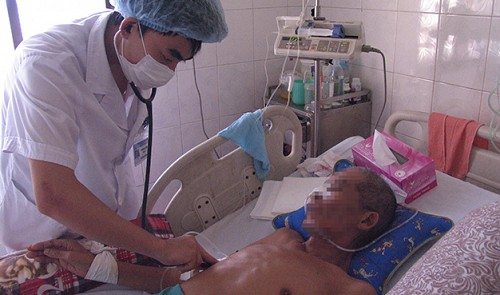Half of Vietnam’s population infected with parasitic worms: doctor

Dr. Tran Thanh Duong, head of the National Institute of Malariology, Parasitology and Entomology, released the striking figures at a recent ceremony in Hanoi for launching a program to call on people to worm themselves twice per year to protect their health.
The infected people make up about 50 percent of the population of Vietnam.
Called “6116 Deworming,” the program is aimed at encouraging everyone to worm themselves on January 6 and June 1 every year.
Intestinal worms not only cause a loss of that much blood every year but they also consume 15 tons of food from their hosts during the same period to survive, Dr. Duong said.
Environmental hygienic conditions in Vietnam are still poor while the country’s hot and humid tropical climate is very suitable for the survival, development and spread of intestinal worms in the environment.
Such worms spread very quickly in crowded residential areas, especially in those where people are keen to eat raw vegetables, half-done meat or raw fish – the foods that create favorable conditions for parasites to live and develop.
Intestinal worm infection will cause different sorts of harm to human health such as anemia, micro-nutrient deficiency, loss of concentration, liver, gall and lung diseases, and adverse effects on the physical and spiritual development of the infected people, especially women and children, Dr. Duong said.
He emphasized that health conditions will get worse in infected people with weak immune systems, which in turn can lead to fatalities.
According to a global nutrition survey made in 2014, Vietnam was among the 78 countries suffering the greatest burden of malnutrition, including malnutrition in children under five years old and anemia in women in reproductive ages.
Accordingly, the proportion of underweight children in Vietnam in 2014 was 14.5 percent, and the rate of short and stunted children was 24.9 percent.
In addition, anemia was recorded in 28.8 percent of women in reproductive ages, 36.5 percent of pregnant women, and 29.2 percent of children under five in the same year.
Such a worrying situation has been caused by not only genes and diets, but also by parasitic worm infection among communities.
Meanwhile, public awareness of the need and benefit of regular deworming has still been low, Dr. Duong said.
A recent small-scale survey in Ho Chi Minh City showed that 56.4 percent of parents do not have their children dewormed every six months and 4.1 percent of parents have never had their children dewormed, the doctor said.
What the stars mean:
★ Poor ★ ★ Promising ★★★ Good ★★★★ Very good ★★★★★ Exceptional
Latest News
More News
- 14th National Party Congress wraps up with success (January 25, 2026 | 09:49)
- Congratulations from VFF Central Committee's int’l partners to 14th National Party Congress (January 25, 2026 | 09:46)
- List of newly-elected members of 14th Political Bureau announced (January 23, 2026 | 16:27)
- 14th Party Central Committee unanimously elects To Lam as General Secretary (January 23, 2026 | 16:22)
- List of members of 14th Party Central Committee announced (January 23, 2026 | 09:12)
- Highlights of fourth working day of 14th National Party Congress (January 23, 2026 | 09:06)
- Press provides timely, accurate coverage of 14th National Party Congress (January 22, 2026 | 09:49)
- Press release on second working day of 14th National Party Congress (January 22, 2026 | 09:19)
- Minister sets out key directions to promote intrinsic strength of Vietnamese culture (January 22, 2026 | 09:16)
- 14th National Party Congress: Renewed momentum for OVs to contribute to homeland (January 21, 2026 | 09:49)
















 Mobile Version
Mobile Version